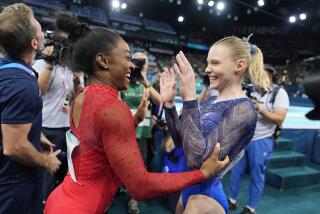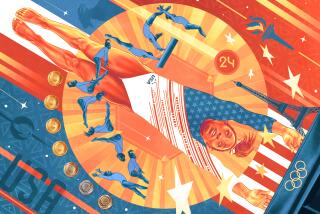Bobek Not Gone, Just Forgotten
- Share via
NAGANO, Japan — I never thought I’d see the day when Nicole Bobek walked into a skating rink and nobody noticed.
She was a born head turner, becoming a professional at age 12. That’s when George Steinbrenner, a U.S. Olympic Committee vice president at the time, saw one of her practices and was so impressed that he became her financial backer.
A few years later, Steinbrenner would be similarly struck by another figure skater and contribute $20,000 for her training. How could he have known that Tonya Harding’s husband, Jeff Gillooly, would use the money to hire hit men for an assault on Nancy Kerrigan? But that was another Winter Olympics, another story.
Bobek, 20, is here for this Olympics.
Not that anyone has acknowledged it. If she didn’t see herself on the labels of the Campbell’s Soup cans along with Michelle Kwan and Tara Lipinski, Bobek would wonder whether she exists at all.
“It’s been upsetting,” she said Monday, after a practice for Wednesday night’s short program. “When I look in the papers at the Olympic previews, I see Tara and Michelle, never me.
“It makes me want to say, ‘Hey, I’m still here. Don’t forget about me.’ ”
She shrugged.
“In Chicago, they’re rooting for me.”
She expounded on the third-woman theme in a recent interview with her hometown newspaper, the Chicago Tribune.
She complained specifically about the reception she received upon earning a berth on the U.S. Olympic team after returning to Lake Arrowhead’s International Ice Castles, where she has trained for the last two seasons.
Most of the signs at the rink congratulated Kwan but not Bobek. That’s understandable. Kwan is from Torrance and, for all practical purposes, began her figure skating career and now lives at Lake Arrowhead. Bobek has been around. I lost count of her coaches and training sites when I ran out of fingers.
But Bobek didn’t understand.
“Even the signs that included me, it was always after Michelle,” she said. “That was kind of hard.”
One person who wrote to congratulate her was Gwen Stefani. She’s the lead singer for a band, No Doubt, that has an alternative punk style, sort of like Bobek’s off the ice.
“She really liked me,” Bobek said of Stefani’s enthusiasm for her third-place performance behind Kwan and Lipinski at the national championships last month in Philadelphia. “She thought I was the only one with that much energy out there.”
The only publicity she has received since arriving here Friday came when Russian ice dancer Pasha Grischuk fingered Bobek as the one who slapped her on a tour last summer in a fight over a man.
Bobek said she doesn’t recall the incident, saying Grischuk talks about it because she needs attention “24 and 7.” Translation: 24 hours a day, seven days a week.
Then she protests because she’s not receiving enough attention.
You would think Bobek had all of that she could stand during the 1994-95 season.
First, she was arrested on a home invasion charge. She claimed it was a misunderstanding, pleaded innocent and eventually received probation.
Then, at a time when everyone figured there was no way she could concentrate on skating with a criminal charge hanging over her head, she performed better than ever and upset Kwan to win the national championship. It was hardly a fluke because Bobek finished third in the world championships, again one place ahead of Kwan.
Bobek, unfortunately, tried to cash in, injured herself during an ice show and couldn’t repeat as national champion.
That experience, however, led her back to her favorite coach, Carlo Fassi, at Lake Arrowhead. The legend who coached Peggy Fleming and Dorothy Hamill to Olympic gold had Bobek back on the podium with a third-place finish at the 1997 nationals and competing at the worlds in Switzerland, where he died of a heart attack.
She dedicated this season to him while training with his widow, Christa Fassi.
Many people thought Bobek wouldn’t live up to that responsibility.
One competitor, Tonia Kwiatkowski, said her goal at nationals was to knock Bobek off the soup cans.
Many people are often wrong about Bobek.
She missed five days of practice after the national championships because of a hip injury, caught bronchitis on the day of the opening ceremony and didn’t arrive in Nagano until five days before the short program.
But no one should be surprised if she leaves with a medal, especially after one contender, Germany’s Tanja Szewczenko, withdrew because of a viral infection and another, Russia’s Maria Butyrskaya, drew the dreaded first position for the short program, virtually guaranteeing her low scores in the barely comprehensible world of figure skating judging.
In one of his last interviews before he died, at the Lake Arrowhead chalet he shared with his wife, Fassi said he had long surrendered the attempt to turn Bobek into a dedicated practice skater but that he had never seen anyone, not even Fleming or Hamill, who could seize the moment the way she can when inspired.
She’ll never have another moment like this one.
“I have to go out and do that,” she said when someone mentioned Fassi’s comment to her this week. “Then I’ll get recognized.”
More to Read
Go beyond the scoreboard
Get the latest on L.A.'s teams in the daily Sports Report newsletter.
You may occasionally receive promotional content from the Los Angeles Times.






